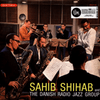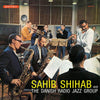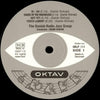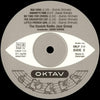











Sahib Shihab and The Danish Radio Jazz Group
ORDER LIMITED TO ONE ITEM PER CUSTOMER
Baritone saxophone, flute, cowbell - Sahib Shihab
Bass - Niels-Henning Ørsted Pedersen [click here to see more vinyl featuring Niels Henning Orsted Pedersen]
Alto saxophone, clarinet - Poul Hindberg
Baritone saxophone - Ib Renard
Baritone saxophone, flute, clarinet - Bent Nielsen
Drums - Alex Riel
Trumpet - Allan Botschinsky, Palle Mikkelborg, Palle Bolvig
Guitar - Fritz von Bülow
Piano - Bent Axen
Tenor saxophone, flute - Bent Jædig, Niels Husum
Trombone, bass - Svend Åge Nielsen
Trombone, euphoium - Torolf Mølgaard
Tuba - Poul Kjældgård
Vibraphone - Louis Hjulmand
Written by Sahib Shihab
1 LP, standard sleeve with double Insert
Limited to 3,000 copies
Original analog Master tape : YES
Heavy Press : 180g
Record color : black
Speed : 33 RPM
Size : 12'’
Stereo
Studio
Record Press : Garcia & Co, Marciac, France
Label : SAM Records
Original Label : Oktav
Recorded August 18, 1965 – August 21, 1965 at Danmarks Radio
Engineered by Birger Swan
Original session produced by George Swensson
Reissue produced by Fred Thomas
Remastered by Kevin Gray at Cohearent Audio
Photography by Ebbe Wraae and Jan Persson
Liner Notes by Erik Moseholm
Originally released in April 2008
Reissued in December 2023
Tracks:
Side A:
1. Di-Da
2. Dance of the Fakowees
3. Not Yet
4. Tenth Lament
Side B:
1. Mai Ding
2. Harvey's Tune
3. No Time for Criers
4. The Crosseyed Cat
5. Little French Girl
Reviews :
"Besides being one of the first jazz musicians to convert to Islam and change his name (1947), Sahib Shihab was also one of the earliest boppers to use the flute. But he was also a fluent soloist on the alto, as well as the baritone sax, the latter being the instrument with which he became most frequently associated. Shihab first worked professionally with the Luther Henderson band at the age of 13 while still studying with Elmer Snowden.
At 16, he attended the Boston Conservatory (1941-1942) and later worked as the lead alto in the 1944-1945 Fletcher Henderson band, billed as Eddie Gregory. After his religious conversion, he fell in with the early bop movement, recording several now-famous sides on alto with Thelonious Monk for Blue Note in 1947 and 1951, and playing with Art Blakey in 1949-1950 and the Tadd Dameron band in 1949. Following some empty patches where he had to work odd jobs for a living, Shihab played with Dizzy Gillespie in 1951-1952, Illinois Jacquet in 1952-1955, and the Oscar Pettiford big band in 1957. After arriving in Europe with Quincy Jones' big band in 1959-1960, he remained there until 1986 (mostly in Copenhagen), except for a long Los Angeles interlude (1973-1976). While on the Continent, he played in the Clarke-Boland big band for nearly a decade (1963-1972); he can be heard applying advanced vocal effects to his attractive flute work on the superb Clarke-Boland Big Band LP (Atlantic, 1963). He recorded only a handful of albums as a leader over the decades for Savoy, Argo, Atlantic, and Chess; a 1963 live date in Copenhagen is available on Black Lion." AllMusic Review by Richad S. Ginell.
"Sahib Shihab (1925-1989) played alongside such greats as Thelonious Monk, Dizzy Gillespie, Tadd Dameron, and Art Blakey in the 1940s and 50s. But in order to escape the racial problems in the United States and take advantage of the increased appreciation and opportunities for jazz abroad, he left for Europe and settled in Copenhagen in 1962. He became one of the featured soloists in the Clarke-Boland Big Band and joined the relatively young Danish Radio Jazz Group around the same time.
This group, which boasted future international jazz icons Palle Mikkelborg and Niels Henning Orsted Pedersen, gave Shihab a rare outlet to present his own compositions.
This outstanding recording presents Sahib Shihab in exceptionally fine form, presiding over two sessions recorded in August 1965. Unlike most American jazz recordings of the time, there are no concessions to popular fads, rock and roll, or movie themes. All nine tracks here are Shihab originals that mix his post-bop leanings with intriguing modal experiments. Shihab sticks to baritone sax for most of the 37-minute program (except "Harvey's Tune," which prefigures the C-BBB version of Burt Bacharach's "Wives And Lovers" and the brilliantly playful "The Crosseyed Cat"), but he hardly ever dominates. He is the most democratic of leaders, letting the orchestra set the agenda and allowing ample solo space to his talented stablemates.
Shihab's interesting and too-little known compositions make this disc the pleasure that it is. All start with something attention grabbing, then proceed to swing and challenge in equal measure, never moving toward a predictable destination. The opening "Di-Da," titled for the melody's staccato cadence, has a sinewy, finger-snapping crime-jazz groove. This, "Not Yet," and "The Crosseyed Cat" are the disc's best, most captivating tunes. All three deserve to be much better known. "Dance of the Fakowees," named for an Indian tribe, and "Mai Ding," named for the Japanese poet, suggest Shihab was listening closely to Sun Ra's Arkestra, but "Mai Ding" also hints that Shihab understood the R&B appeal of both Quincy Jones and Oliver Nelson's work.
"Dance Of The Fakowees" and "Harvey's Tune" offer something of a tribute to the vastly underrated Francy Boland, whose musical stewardship benefited Shihab throughout much of the 1960s. Shihab himself is featured on baritone sax for the pretty "What's New"-like "No Time For Cries," and his arranging skills are prominently front-lined on the "Django"-like "Tenth Lament," which seemingly suggests Bill Holman's structures for Stan Kenton.
Everything here except "Little French Girl" (which finds Shihab singing, in contrast to Jimmy Woode's vocal numbers on other Shihab records) had been formerly released on an Oktav LP of the same name and all except "Dance Of The Fakowees," "Mai Ding" and "Little French Girl" also appear on the compilation Sentiments (Storyville, 2005).
With so few examples of Shihab's magnificent artistry outside of the Clarke-Boland Big Band available, Sahib Shihab and the Danish Radio Jazz Group is a rare opportunity to hear the great baritone saxophonist and dynamic flautist doing what he does best in what is ultimately a complimentary and wondrous setting." All About Jazz Review by Douglas Payne
Ratings :
Discogs : 4.86 / 5


